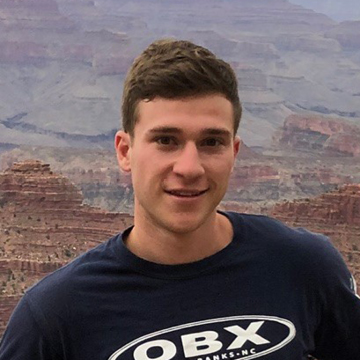APS graduate student learning commercialization skills via internship
APS graduate student learning commercialization skills via internship

Slamowitz, a third-year graduate student in Professor Scott Warren’s lab, began his internship in fall of 2022. Along with other OTC staff and interns, Slamowitz pushes UNC-Chapel Hill technologies towards commercialization to broaden the impact of the technology.
One of Slamowitz’ main responsibilities is writing executive summaries for patented technologies, many of which originate from the department of applied physical sciences (APS). “I read through disclosures and identify the most important parts to develop marketing summaries for both the OTC site and for potential customers who might be interested in licensing the technology,” he explains. Another critical duty is using search techniques to find potential overlaps in existing patents.
He initially discovered this internship opportunity through a class assignment in “Materials Science First Year Seminar: Developing your plan for success” to connect with experts and professionals in students’ areas of interest. Since Slamowitz is interested in commercialization, he reached out to Chance Rainwater, PhD, Senior Commercialization Manager at OTC. Via this networking, Slamowitz learned of OTC’s internship opportunities and successfully interviewed for the program.
Under the leadership of Peter Liao, Commercialization Manager at OTC, the internship program is geared toward preparing graduate students for their future careers. Specifically, Slamowitz explains that workshops on topics like license agreements make it educational. “Beyond the hands-on professional experience the internship offers, it’s great to simultaneously learn something in an organized manner within the program,” Slamowitz adds. “Plus, I enjoy working with other interns from diverse disciplines including material sciences, biomedical, and pharmacy.”
Slamowitz’ internship provides several key takeaways that he plans to apply to his future after graduation. “I have gained valuable experience in writing summaries, understanding literature, and honing presentation skills,” he says. “These skills complement the knowledge from my PhD coursework to prepare me for a career in the marketing and business aspect of science.”
He notes that there were some surprising elements to the internship and nature of commercialization work. “The exchange of technology between industry and university is not as easy as you may expect,” he explains. “In reality, there are a lot of issues like cost analysis, legal nuance, international trade, and language barriers that make invention licensing harder than one might imagine.”
Slamowitz comments on the overall value of internships in pursuit of career goals and professional growth. “Ultimately, it’s important to gain experience, make connections, and take advantage of every opportunity to best position yourself for success,” he says. “Participating in experiences like virtual labs, internships, and networking events that align with your goals is the best thing you can do for your future career.”

